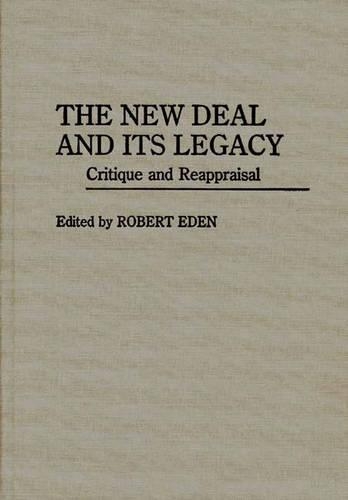
The New Deal and Its Legacy: Critique and Reappraisal
(Hardback)
Publishing Details
The New Deal and Its Legacy: Critique and Reappraisal
By (Author) Robert Eden
Bloomsbury Publishing PLC
Praeger Publishers Inc
23rd June 1989
United States
Classifications
Tertiary Education
Non Fiction
973.9
Physical Properties
Hardback
274
Width 156mm, Height 235mm
624g
Description
The New Deal remains at the center of the national debate concerning the role and function of government--a controversy that reflects increasingly deep divisions within the American body politic. In an attempt to clarify and reframe the underlying issues, the authors of this book examine the principles, political methods, institutions, and programs that came out of the New Deal and assess their consequences and implications for the future. In the opening chapter, Robert Eden reviews changing public assessments of the New Deal and the questions that remain most divisive. Subsequent authors address specific aspects of the New Deal itself, such as farm programs, and regulatory, bureaucractic, and administrative reforms. Others explore the controversial issues that Roosevelt's political philosophy and programs raised. Among these are constitutional questions, enlightened administration, the presidency, electoral realignment divisions and party politics, and the political significance of the welfare state. The concluding chapter discusses the New Deal legacy in today's Democratic party. Placing contemporary political issues in a broad, constructive framework, this book provides new perspectives on a pivotal episode in modern American history and gives us a deeper understanding of the political, economic, and constitutional challenges we currently face.
Reviews
A collection of neoconservative analyses of the New Deal that originated at conferences (1986, 1987) held at Hillsdale College. The volume offers, for the most part, thoughtful appraisals counter to the run of current interpretations. The perspective is set by Peter J. Coleman's extensive essay that argues the New Deal was the culmination of a generation of reformers who were committed to "interventionism" and sought to create an "enlightened administrative welfare state." Although clear disagreements are in evidence, the common judgment appears to be that the New Deal "legacy" has been to reduce individual liberty, restrict "development of human faculties," "enervate" citizen involvement in governing, and change the constitutional structure of the government. Essays range from the brief (Frisch) and truculent (Shenfield) to the lengthy and probing (Milkis and Eden); as is generally the case in such collections, some are more persuasive than others. Endnotes, bibliography, and index are provided. Recommended for all academic and large public libraries.-Choice
"A collection of neoconservative analyses of the New Deal that originated at conferences (1986, 1987) held at Hillsdale College. The volume offers, for the most part, thoughtful appraisals counter to the run of current interpretations. The perspective is set by Peter J. Coleman's extensive essay that argues the New Deal was the culmination of a generation of reformers who were committed to "interventionism" and sought to create an "enlightened administrative welfare state." Although clear disagreements are in evidence, the common judgment appears to be that the New Deal "legacy" has been to reduce individual liberty, restrict "development of human faculties," "enervate" citizen involvement in governing, and change the constitutional structure of the government. Essays range from the brief (Frisch) and truculent (Shenfield) to the lengthy and probing (Milkis and Eden); as is generally the case in such collections, some are more persuasive than others. Endnotes, bibliography, and index are provided. Recommended for all academic and large public libraries."-Choice
Author Bio
ROBERT EDEN is Professor of Political Science at Hillsdale College, Hillsdale, Michigan. He is the author of Political Leadership and Nihilism: A Study of Weber and Nietzsche.
